#Les Miserables 1972
Text
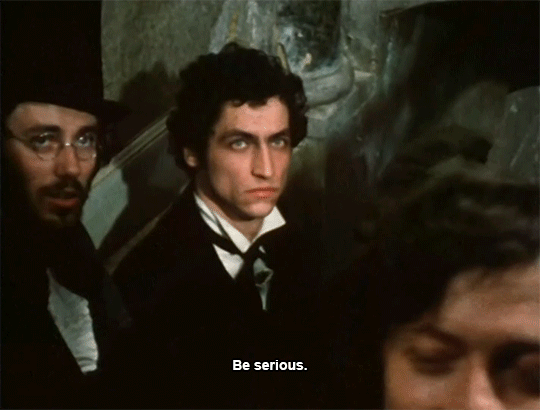


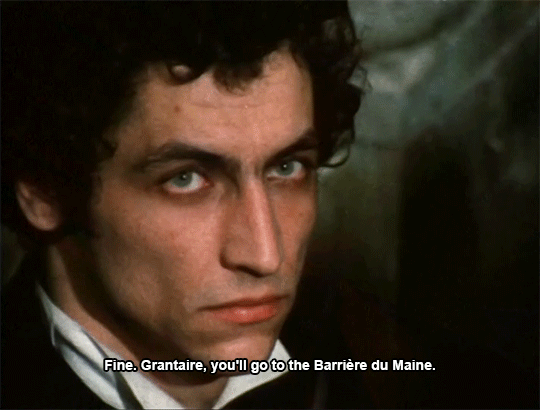
LES MIS LETTERS IN ADAPTATION - Enjolras and his Lieutenants, LM 4.1.6 (Les Miserables 1972)
“Be serious,” said Enjolras.
“I am wild,” replied Grantaire.
Enjolras meditated for a few moments, and made the gesture of a man who has taken a resolution.
“Grantaire,” he said gravely, “I consent to try you. You shall go to the Barrière du Maine.”
Grantaire lived in furnished lodgings very near the Café Musain. He went out, and five minutes later he returned. He had gone home to put on a Robespierre waistcoat.
“Red,” said he as he entered, and he looked intently at Enjolras. Then, with the palm of his energetic hand, he laid the two scarlet points of the waistcoat across his breast.
#Les Mis#Les Mis Letters#Les Miserables#Les Mis Letters in Adaptation#Les Mis 1972#Les Miserables 1972#Enjoltaire#Grantaire#Enjolras#lesmisedit#lesmiserablesedit#pureanonedits#LM 4.1.6#I kinda love this Grantaire!!!#lesmiserables1972edit
432 notes
·
View notes
Text
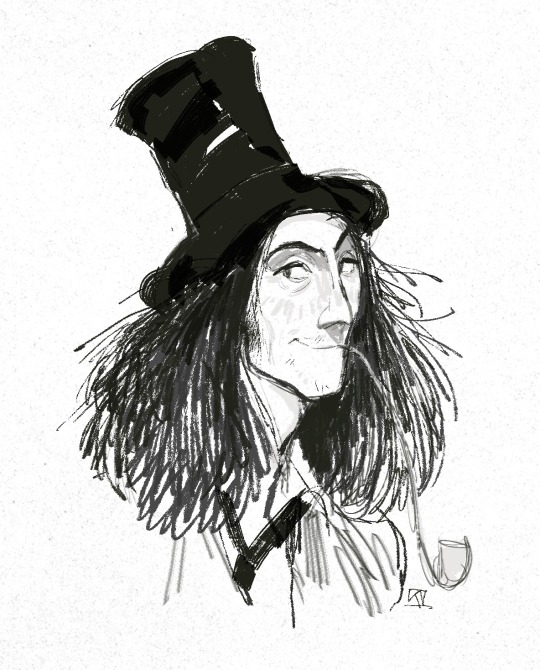
1972 prouvaire (!) i just had to draw him he’s perfect
153 notes
·
View notes
Text
guysss i hate being this person but does anyone know where a poor desperate soul can watch 1972 Les Mis?!?!?!?! I NEED more Amis content its not even funny i’m gonna throw a fit
#les mis#les miserables#les miz#les amis de l'abc#the brick#musical theatre#les mis headcanons#enjolras#enjoltaire#courfeyrac#les mis 1972#les miserables 1972#i see from random clips on here that it has the archives ina watermark but :( camt find it
34 notes
·
View notes
Video
1972 les amis intro bit except a little edited bc im fucking insane
#tag yourself#im obvs bahorel going :3#les mis#les miserables#1972 les mis#les amis#les amis de l'abc#enjolras#courfeyrac#combeferre#grantaire#feuilly#joly#lesgles#bahorel#prouvaire#jehan prouvaire#jean prouvaire#e/r#exr#enjoltaire
796 notes
·
View notes
Text

72tober day 8(tre libre)
get his ass combeferre
180 notes
·
View notes
Text

1972 Theodule says: Hit the SLAY button!
#art#artist#digital art#les mis#fanart#les miserables#original art#les mis 1972#1972 theodule#theodule is so fucking slay#my art#les mis brick
209 notes
·
View notes
Text
video description: a video edit of the 1972 miniseries adaptation of les misérables. it focuses on éponine and her relationship with marius, and is set to “you belong with me” by taylor swift. end description.
why can't you see!! || a birthday gift for @jondrettegirls <3
#this originally started silly and then became. devastating as well#hope u enjoy. i love you so much it's insane & im especially so grateful for our shared insanity these past several months#spending time with you this summer was so incredibly surreal!! happy 3 monthaversary to seeing enjolras irl in front of our own eyes.#here's to seeing you again irl at some point 🥂#les mis#les miserables#les mis 1972#eponine#eponine thenardier#marius pontmercy#mp4#not gonna tag this as c.osette despite her prominence bc that feels so rude to her. this video isn't abt her it's abt ponine being delulu#and literally just some teenage girl despite it all#oh also sorry for using ybwm (stolen version) but her voice sounds so much younger here. which is so important of course#lucy tag
79 notes
·
View notes
Text

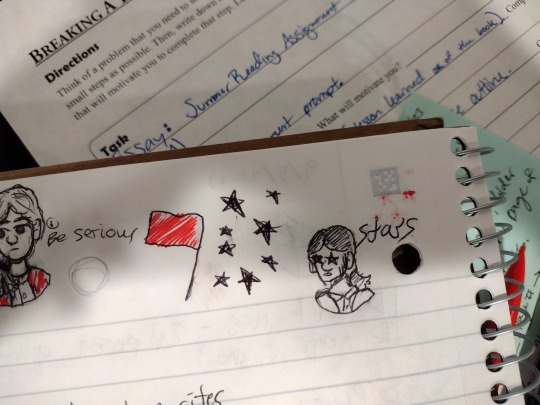

Drawings from history class (1 and 3) and one from yesterday (2)
I know that the last one doesn't look like them in the 1972 movie, ok? Leave me alone.
#e x r#enjoltaire#les mis#javert#stars#art#les miserables#les mis 1972#Not enj looking like a anime girl in the first one#enjolras#grantaire
27 notes
·
View notes
Text
my favorite ami went to grantaire to bahorel to joly to courfeyrac to jehan and now BOSSUET
#les mis#les miserables#bossuet#lesgle#les amis de l'abc#les amis#bossuet ily omg 😍😍😍😍😍#also productions keep on giving him hair 😭😭 bro is BALDING#1972 kinda cool tho... even tho he has hair#my unlucky baby girl#grantaire#courfeyrac#joly#bahorel#jehan#im going insane over bossuet
7 notes
·
View notes
Note
Hello! I'm having a hard time finding GOOD adaptations of Les Mis (apart from the musical of course) because so far I have only managed to run into the bad ones (BBC 2018, the Liam Neeson one, the whole nightmaris works). Anyway, I figured this would be a good place to ask for recs of adaptations that aren't just a complete butchering of the source material! (Oh and I HAVE seen Shoujo Cosette). Thank you :)
Ooh! I have some favorites!
Just good all around:
1925 , French(silent film! there's a fan copy going around with subtitles but honestly , it's a silent film; you'll be fine if you already know the story)
1934, French (ABSOLUTELY not 1935) - this one's a Criterion release so it's not too hard to find it subbed!
1964 Italian miniseries -ten parts, fantastic all the way through, actually paces itself well enough to spend real time on the politics in the second half!
Good in Certain Specific Ways
1972, French: lots of focus on the Amis and Gavroche and Paris! Not so much on Valjean, Cosette, and Fantine. But what it does do well is SO good even if they keep stealing Bahorel's lines for other characters, do NOT talk to me about how he's a Minor Character when apparently he has enough scenes to feed an army , and not something easy to find in adaptations, that I think it's worth watching.
1967 BBC, English: a tv miniseries that is half about the best English adaptation I've ever seen, and half ...very not that. The original writer genuinely died halfway through the making of this and whoo boy you can tell, but those first few episodes are really good and in particular have some of the best work with Javert's character that I've ever seen.
1995, French: set in the first few decades of the 20th century, not a direct adaptation but rather a study of how the themes in Les Miserables repeat across multiple eras and lives. One of the most intense and painful Les Mis films I've seen but also one that really digs into its meaning , and the importance of how a story can affect people. VERY worth seeking out.
Not a Filmed Adaptation But Genuinely One of the Best:
The manga by Takahiro Arai, available in Japanese, French, and English ! the last of the 4 volume English omnibus editions is coming out this winter. Arai is a clear fan of the novel and there's so much care put into this, it's a great adaptation and a great manga in its own right.
As to where to find all these--well the English manga omnibus is being released by Seven Seas, but the others, it's going to kind of depend? There's so many Issues with various videos being available only in some locations, but I bet if you ask other fans here who are watching or have watched versions you're interested in, they can help you!
I hope you find some new favorites here!:D
#...don't ask me though because I'm currently transferring my libraries between computers ><#or I'd have offered
36 notes
·
View notes
Text

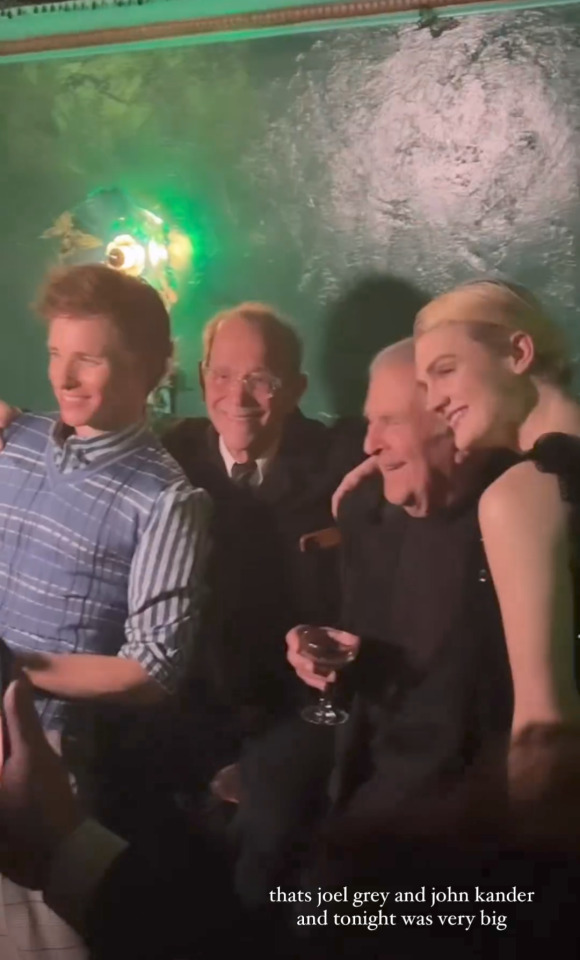

The two Master of Ceremonies of Cabaret, yesterday and today!.
Life is a Cabaret! 🎭
What a night! Last night, Eddie and company celebrated Mr. Joel Grey's 92nd birthday at Cabaret New York at the Kit Kat Club. Joel Grey who performed the Master of Ceremonies of "Cabaret" on Broadway in 1966, and reprised this role in the 1972 film adaptation, directed by Bob Fosse, was in the audience, so was John Kander who wrote all the original music. Happy Birthday, Joel! 🎂
📷 My screenshots from Arthur Jones IG Stories.
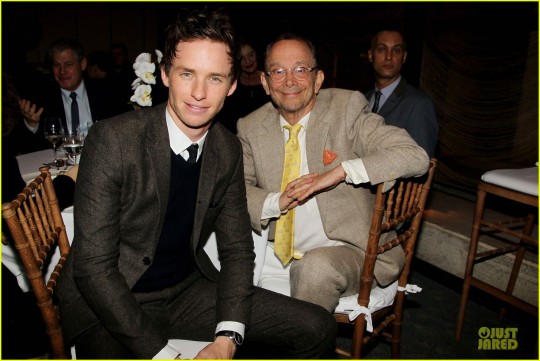
📸 Memories: And in this old photo, Eddie with Joel Grey during Les Miserables' luncheon, at the Four Seasons Restaurant, on December 11, 2012, in New York.
#eddie redmayne#eddieredmayne#redmayne#joel grey#john kander#cabaret 2024#broadway#what a nice surprise#the emcee#gayle rankin
11 notes
·
View notes
Text

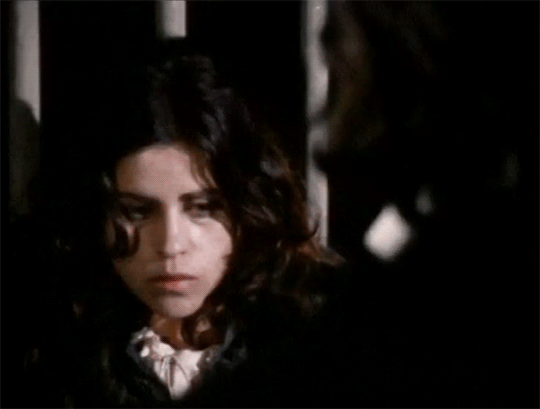
LES MIS LETTERS IN ADAPTATION - A Cab Runs in English and Barks in Slang, LM 4.8.4 (Les Miserables 1972)
Éponine caught Montparnasse’s hand.
“Take care,” said he, “you’ll cut yourself, I’ve a knife open.”
...
“My good friend, Mr. Montparnasse,” said Éponine, “I entreat you, you are a good fellow, don’t enter.”
“Take care, you’ll cut yourself,” replied Montparnasse.
...
“Well, go in, then, the rest of you,” exclaimed Montparnasse. “Do the job. I’ll stay here with the girl, and if she fails us—”
He flashed the knife, which he held open in his hand, in the light of the lantern.
...
As they went, Montparnasse muttered:—
“Never mind! if they had wanted, I’d have cut her throat.”
#Les Mis#Les Miserables#Les Mis Letters#Eponine#Eponine Thenardier#Montparnasse#Les Mis 1972#Les Miserables 1972#lesmisedit#lesmiserablesedit#lesmiserables1972edit#pureanonedits#LM 4.8.4#Les Mis Letters in Adaptation
142 notes
·
View notes
Text
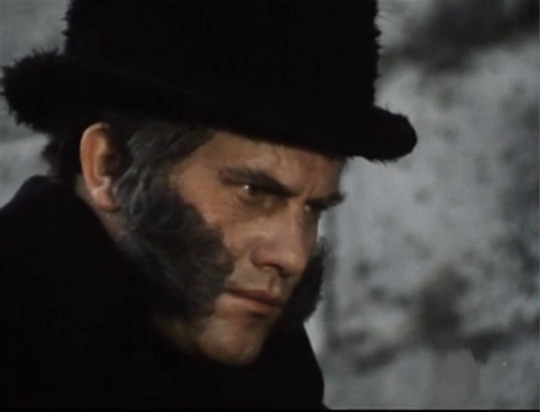
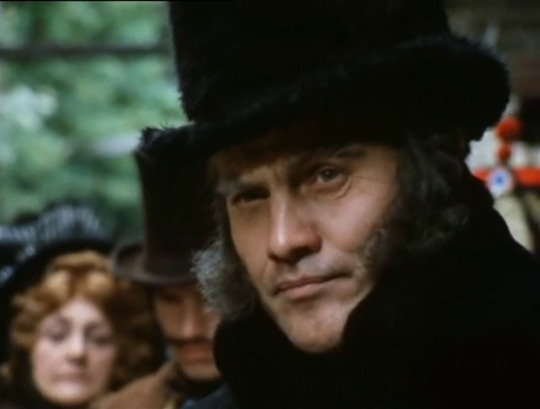

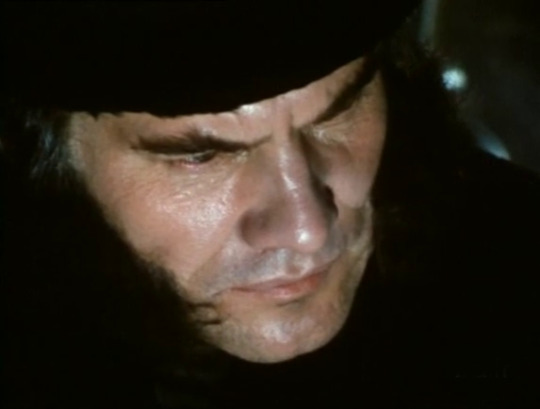
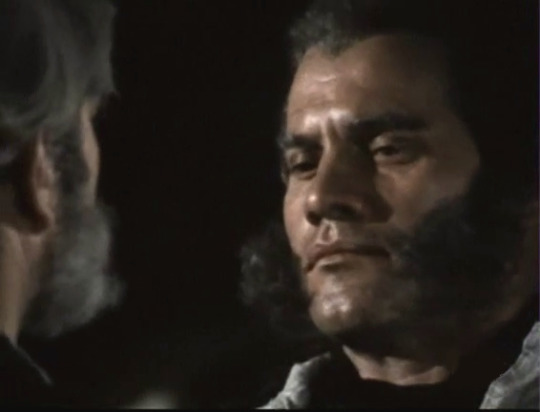
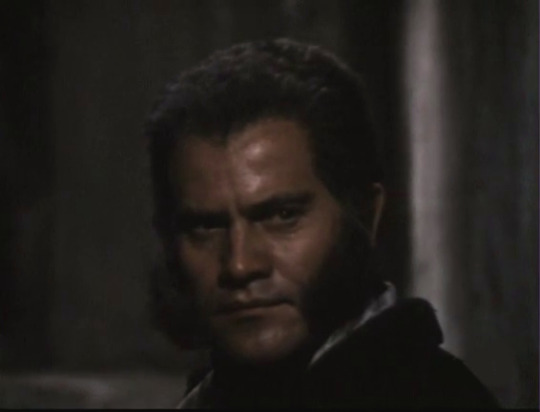

Some stills of Bernard Fresson as Inspector Javert from the 1972 two-part film adaptation of Les Miserables (dir. Marcel Bluwal)
#javert#les miserables#I love you werewolf man#genuinely love this javert. like hes S-rank for me. he is just so javert#his dead stare and green eyes. A+++#also wowie the new photoset editor is terrible thanks tumblr
51 notes
·
View notes
Text
The Best Books
The list is made from an academic point of view. More books may be added or any book may be taken out of the list at anytime.
Books that enlightened, outraged, provoked and comforted us
Pride and Prejudice by Jane Austen, 1813
Emma by Jane Austen, 1815
The Count of Monte Cristo by Alexandre Dumas, 1844
Wuthering Heights by Emily Bronte, 1847
Vanity Fair by William Makepeace Thackeray, 1848
Great Expectations by Charles Dickens, 1860
Les Miserables by Victor Hugo, 1862
Crime and Punishment by Fyodor Dostoyevsky, 1866
Little Women by Louisa May Alcott, 1868
Middlemarch: A Study of Provincial Life by George Eliot, 1874
Anna Karenina by Leo Tolstoy, 1877
Adventures of Huckleberry Finn by Mark Twain, 1884
Germinal by Émile Zola, 1885
The Short Stories of Anton Chekhov by Anton Chekhov, 1888
The Ambassadors by Henry James, 1903
In Search of Lost Time by Marcel Proust, 1913
Dubliners by James Joyce, 1914
The Mysterious Stranger by Mark Twain, 1916
Ulysses by James Joyce, 1922
The Magic Mountain by Thomas Mann, 1924
An American Tragedy by Theodore Dreiser, 1925
The Great Gatsby by F. Scott Fitzgerald, 1925
To the Lighthouse by Virginia Woolf, 1927
Coming of Age in Samoa by Margaret Mead, 1928
All Quiet on the Western Front by Erich Remarque, 1929
The Sound and the Fury by William Faulkner, 1929
The Autobiography of Alice B. Toklas by Gertrude Stein, 1933
Tender is the Night by F. Scott Fitzgerald, 1934
Gone With the Wind by Margaret Mitchell, 1936
Death on the Nile by Agatha Christie, 1937
Out of Africa by Isak Dinesen, 1937
Their Eyes Were Watching God by Zora Neale Hurston, 1937
The Grapes of Wrath by John Steinbeck, 1939
Romola by George Eliot, 1940
Black Boy by Richard Wright, 1945
Hiroshima by John Hersey, 1946
Robinson Crusoe by Daniel Defoe, 1946
A Streetcar Named Desire by Tennessee Williams, 1947
Under the Volcano by Malcolm Lowry, 1947
The Sheltering Sky by Paul Bowles, 1949
The Catcher in the Rye by J. D. Salinger, 1951
Invisible Man by Ralph Ellison, 1952
Lord of the Flies by William Golding, 1954
The Sun Also Rises by Ernest Hemingway, 1954
Lolita by Vladimir Nabokov, 1955
Notes of a Native Son by James Baldwin, 1955
Our Man in Havana by Graham Greene, 1958
The Civil War by Shelby Foote, 1958
Raise High the Roof Beam, Carpenters and Seymour: An Introduction by JD Salinger, 1959
Rabbit, Run by John Updike, 1960
Where Angels Fear to Tread by E. M. Forster, 1960
The Death and Life of Great American Cities by Jane Jacobs, 1961
The Making of the President by Theodore H. White, 1961
Pale Fire by Vladimir Nabokov, 1962
The Spy Who Came in from the Cold by John le Carre, 1963
A Moveable Feast by Ernest Hemingway, 1964
The Autobiography of Malcolm X by Malcolm X, 1965
Manchild in the Promised Land by Claude Brown, 1965
Against Interpretation, and Other Essays by Susan Sontag, 1966
In Cold Blood by Truman Capote, 1966
One Hundred Years of Solitude by Gabriel Garcia Marquez, 1967
The American Cinema by Andrew Sarris, 1968
The Double Helix by James Watson, 1968
The Electric Kool_Aid Acid Test by Tom Wolfe, 1968
I Know Why the Caged Bird Sings by Maya Angelou, 1969
Slaughterhouse-Five by Kurt Vonnegut, 1969
The French Lieutenant’s Woman by John Fowles, 1969
Are You There God? It’s Me Margaret by Judy Blume, 1970
Ball Four by Jim Boutton, 1970
The Complete Stories of Flannery O’Connor, 1971
The Best and the Brightest by David Halberstam, 1972
The Politics of Nonviolent Action by Gene Sharp, 1973
All The President’s Men by Bob Woodwad and Carl Bernstein, 1974
The Power Broker by Robert A. Caro, 1974
Ragtime by E. L. Doctorow, 1975
Sociobiology by Edward O. Wilson, 1975
The Executioner’s Song by Norman Mailer, 1979
The Clan of the Cave Bear by Jean M. Auel, 1980
Follow The River by James Alexander Thom, 1981
Psychoanalysis: The Impossible Profession by Janet Malcolm, 1981
The Fractal Geometry of Nature by Benoit Mandelbrot, 1982
The Last Lion: Winston Spencer Churchill by William Manchester, 1983
The Unbearable Lightness of Being by Milan Kundera, 1984
The Center of the Cyclone by John Lilly, 1985
Great and Desperate Cures by Elliott Valenstein, 1986
Maus by Art Spiegelman, 1986
The Making of the Atomic Bomb by Richard Rhodes, 1986
And the Band Played On by Randy Shilts, 1987
Beloved by Toni Morrison, 1987
The Closing of the American Mind by Allan Bloom, 1987
A Brief History of Time by Stephen Hawking, 1988
Battle Cry of Freedom: The Civil War Era by James M. McPerson, 1988
The Society of Mind by Marvin Minsky, 1988
Summer’s Lease by John Mortimer, 1989
A Prayer For Owen Meany by John Irving, 1989
A Soldier of the Great War by Mark Helprin, 1991
Mortal Questions by Thomas Nagel, 1991
PIHKAL by Alexander and Ann Shulgin, 1991
Lonely Hearts of the Cosmos by Dennis Overbye, 1991
The Six Wives of Henry VIII by Alison Weir, 1991
Band of Brothers by Stephen E. Ambrose, 1992
The Talented Mr Ripley by Patricia Highsmith, 1992
The English Patient by Michael Ondaatje, 1993
Dreams from My Father by Barack Obama, 1995
Montana Sky by Nora Roberts, 1996
Tuesdays with Morrie: An Old Man, a Young Man, and Life’s Greatest Lesson by Mitch Albom, 1997
War Before Civilization by Lawrence Keeley, 1997
How the Mind Works by Steven Pinker, 1997
A Walk in the Woods by Bill Bryson, 1998
In the Name of Eugenics by Daniel Kevles, 1998
Who Moved My Cheese? by Spencer Johnson, 1998
Interpreter of Maladies by Jhumpa Lahiri, 1999
A Heartbreaking Work of Staggering Genius by Dave Eggers, 2000
Nonzero by Robert Wright, 2000
Chocolat by Joanne Harris, 2000
The Secret Life of Bees by Sue Monk Kidd, 2001
The Illusion of Conscious Will by Daniel Wegner, 2002
Atonement by Ian McEwan, 2003
The Kite Runner by Khaled Hosseini, 2003
The Known World by Edward P. Jones, 2003
Gilead by Marilynne Robinson, 2004
My Sister’s Keeper by Jodi Picoult, 2004
Portofino: A Novel (Calvin Becker Trilogy) by Frank Schaeffer, 2004
Never Let Me Go by Kazuo Ishiguro, 2005
The Book Thief by Marcus Zusak, 2005
The Girl With a Dragon Tattoo by Stieg Larsson, 2008
Lords of Finance: The Bankers Who Broke The World, 2009
Unbroken: A World War II Story of Survival, Resilience and Redemption by Laura Hillenbrand, 2010
Washington: A Life by Ron Chernow, 2010
Orientation: And Other Stories by Daniel Orozco, 2011
Books that inspired debate, activism, dissent, war and revolution
The Torah
Bhagavad Gita
I Ching (Classic of Changes) by Fu Xi
Tao Te Ching by Lao Tzu
The Summa Theologica of St. Thomas Aquinas, 1266
The Divine Comedy by Dante Alighieri, 1321
Don Quixote by Miguel de Cervantes, 1605
Ethics by Baruch de Spinoza, 1677
Pilgrim’s Progress by John Bunyan, 1678
Candide by Voltaire, 1759
Confessions by Jean-Jacques Rousseau, 1781
Critique of Pure Reason by Immanuel Kant, 1781
Democracy in America by Alexis de Tocqueville, 1835
A Christmas Carol by Charles Dickens, 1843
Moby-Dick by Herman Melville, 1851
Uncle Tom’s Cabin by Harriet Beecher Stowe, 1852
Walden (Life in the Woods) by Henry David Thoreau, 1854
Madame Bovary by Gustave Flaubert, 1857
Experiments on Plant Hybridization by Gregor Mendel, 1866
War and Peace by Leo Tolstoy, 1869
Thus Spoke Zarathustra by Friedrich Nietzsche, 1883
Arabian Nights by Andrew Lang, 1898
The Ragged Trousered Philanthropists by Robert Tressell, 1914
Relativity: The Special and General Theory by Albert Einstein, 1916
Psychological Types by Carl Jung, 1921
Mein Kampf (My Struggle or My Battle) by Adolf Hitler, 1925
Der Process (The Trial) by Franz Kafka, 1925
The Tibetan Book of the Dead by Karma-glin-pa (Karma Lingpa), 1927
Brave New World by Aldous Huxley, 1932
The General Theory of Employment Interest and Money by John Maynard Keynes, 1936
The Big Book by Alcoholics Anonymous, 1939
Being and Nothingness by Jean-Paul Sartre, 1943
The Little Prince by Antoine de Saint-Exupery, 1943
The Road To Serfdom by Friedrich von Hayek, 1944
Animal Farm by George Orwell, 1945
Survival in Auschwitz: The Nazi Assault on Humanity by Primo Levi, 1947
The Diary of a Young Girl by Anne Frank, 1947
Nineteen Eighty-Four by George Orwell, 1949
The Second Sex by Simone de Beauvoir, 1949
The Origins of Totalitarianism by Hannah Arendt, 1951
Things Fall Apart by Chinua Achebe, 1958
To Kill a Mockingbird by Harper Lee, 1960
Guerilla Warfare by Che Guevarra, 1961
Capitalism and Freedom by Milton Friedman, 1962
Silent Spring by Rachel Carson, 1962
The Structure of Scientific Revolutions by Thomas Kuhn, 1962
Quotations from Chairman Mao Tse-Tung (The Little Red Book) by Mao Zedong, 1964
Unsafe at Any Speed by Ralph Nader, 1965
Catch 22 by Joseph Heller, 1969
The Female Eunuch by Germaine Greer, 1970
Zen and the Art of Motorcycle Maintenance by Robert M. Pirsig, 1974
The Normal Heart by Larry Kramer, 1987
The Alchemist by Paulo Coelho, 1988
The Vagina Monologues by Eve Ensler, 1995
Harry Potter and the Philosopher’s Stone by J. K. Rowling, 1997
Books that shook civilization, changed the world
The Holy Bible
The Qur’an
The Analects of Confucius
The Iliad and The Odyssey by Homer
The Histories by Herodotus, 440 BC
The Republic by Plato, 380 BC
The Kama Sutra (Aphorisms on Love) by Vatsyayana
On the Shortness of Life by Lucius Annaeus Seneca (The Younger), 62
Geographia by Ptolemy, 150
Meditations by Marcus Aurelius, 160
Confessions by St. Augustine, 397
The Canon of Medicine by Avicenna, 1025
Magna Carta, 1215
The Inner Life by Thomas a Kempis, 1400’s
The Canterbury Tales by Geoffrey Chaucer, 1478
The Prince by Niccolo Machiavelli, 1532
On Friendship by Michel de Montaigne, 1571
The King James Bible by William Tyndale et al, 1611
The First Folio by William Shakespeare, 1623
Principia Mathematica by Isaac Newton, 1687
A Tale of a Tub by Jonathan Swift, 1704
Encyclopaedia or a Systematic Dictionary of the Sciences, Arts and Crafts, 1751
A Dictionary of the English Language by Samuel Johnson, 1755
Patent Specification for Arkwright’s Spinning Machine by Richard Arkwright, 1769
Common Sense by Thomas Paine, 1776
The History of the Decline and Fall of the Roman Empire by Edward Gibbon, 1776
The Wealth of Nations by Adam Smith, 1776
The Social Contract by Jean-Jacques Rousseau, 1762
On the Abolition of the Slave Trade by William Wilberforce, 1789
Rights of Man by Thomas Paine, 1791
A Vindication of the Rights of Woman by Mary Wollstonecraft, 1792
On the Pleasure of Hating by William Hazlitt, 1826
Experimental Researches in Electricity by Michael Faraday, 1839, 1844, 1855
The Communist Manifesto by Karl Marx and Friedrich Engels, 1848
On the Suffering of the World by Arthur Schopenhauer, 1851
Leaves of Grass by Walt Whitman, 1855
On Liberty by John Stewart Mill, 1859
On the Origin of Species by Charles Darwin, 1859
The Rules of Association Football by Ebenezer Cobb Morley, 1863
Das Kapital (Capital: Critique of Political Economy) by Karl Marx, 1867
On Art and Life by John Ruskin, 1886
The War of the Worlds by H. G. Wells, 1898
The Interpretation of Dreams by Sigmund Freud, 1899
The Jungle by Upton Sinclair, 1906
Why Am I So Wise by Friedrich Nietzsche, 1908
Married Love by Marie Stopes, 1918
Lady Chatterly’s Lover by D. H. Lawrence, 1928
A Room of One’s Own by Virginia Woolf, 1929
Civilization and its Discontents by Sigmund Freud, 1930
Why I Write by George Orwell, 1946
30 notes
·
View notes
Text
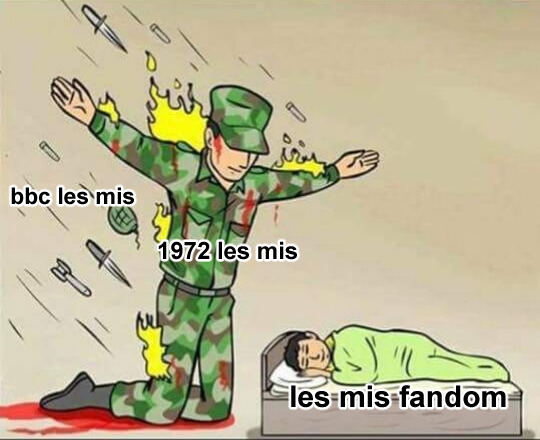
#les mis#les miserables#bbc les mis#1972 les mis#1972 les miserables#bbc les miserables#enjolras#grantaire#les amis de l'abc#combeferre#marius pontmercy#courfeyrac#joly
291 notes
·
View notes
Text

72tober day 3!
a little bit of a rougher one so i dont burn out but i had to do the breakfast trio
164 notes
·
View notes